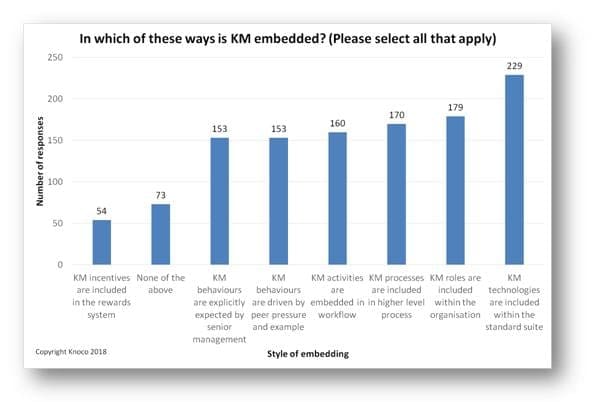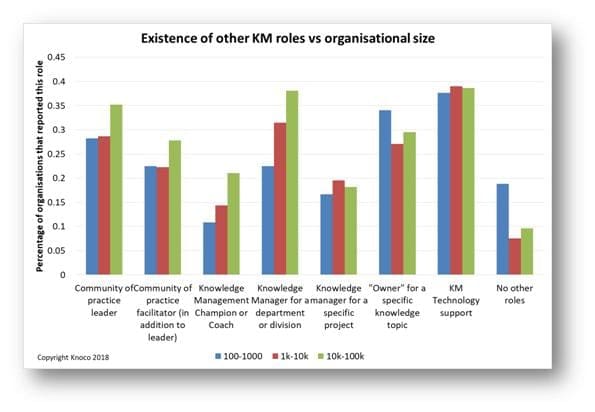
Favorite Part of the role of KM, particularly in manufacturing and production, is to reduce the cost of non-quality When I started my Knowledge Management journey in 1992, my job post was entitled “Quality Advisor”. I was accountable for the quality of the geoscientific work in the BP Norway office. Because
Read More
 Shared by Nick Milton May 1, 2018
Shared by Nick Milton May 1, 2018

Favorite Implementing KM is a change process, part of which involves training. But what sort of training? UXD training, by Andy Bright on Flickr Introducing a knowledge management framework means introducing a set of roles and accountabilities, new processes, new technologies, and new governance frameworks. You can’t just introduce the
Read More
 Shared by Nick Milton April 30, 2018
Shared by Nick Milton April 30, 2018

Favorite In another reprised post from the archives, we look at People Finder systems, and suggest they should follow the model of dating sites rather than Facebook Image from wikimedia commons A “People finder” or “Yellow Pages” is one of the key supporting tools in knowledge management, but at the
Read More
 Shared by Nick Milton April 27, 2018
Shared by Nick Milton April 27, 2018

Favorite An interesting study on a failed Knowledge Management project highlights 7 reasons for failure Here is an interesting study of a failed KM approach in a Pharma organisation, by Ashley Braganza1 and Gerald Mollenkramer. It starts with the following vignette. On a sunny morning in July 1999, Samuel Parsons,
Read More
 Shared by Nick Milton April 26, 2018
Shared by Nick Milton April 26, 2018

Favorite We acknowledge, in KM, that learning from failure is desirable, but what kind of failure are we talking about? image from wikimedia commons We hear the terms “Failure” “Error” and “Mistake” very often in Knowledge Management circles; often treated as synonyms. In particular, the terms “Learning from Failure,” “Learning from
Read More
 Shared by Nick Milton April 25, 2018
Shared by Nick Milton April 25, 2018

Favorite A famous author claims we are the first generation to know less than our parents, and calls this a “net loss of knowledge”. Is he right? Image from wikimedia commons – “The Dunce” According to the writer, Sebastian Faulkes, reported in the Daily Telegraph, this generation of will be
Read More
 Shared by Nick Milton April 24, 2018
Shared by Nick Milton April 24, 2018

Favorite Please find below the Promo Card for my intervew on May 10th with Alex Fullick on the VoiceAmerica channel, on the topic of Lesson Learning TROUBLE VIEWING? Click Here to view the Promo card on the web SIGN-UP NOW! SIGN-UP NOW! Click to become a VoiceAmerica Member for Free!
Read More
 Shared by Nick Milton April 23, 2018
Shared by Nick Milton April 23, 2018

Favorite There are 5 ways in which KM can be embedded in an organisation. Some of these are more common than others, and to fully embed KM can take over a decade. The most common ways of embedding KM, from the Knoco 2014 and 2017 surveys I often have people
Read More
 Shared by Nick Milton April 20, 2018
Shared by Nick Milton April 20, 2018

Favorite Everyone needs an elevator pitch for KM. Base it around these 3 questions. Buzzword Bingo – elevator pitchby Ron Mader on Flickr The elevator pitch is your 30-second attemtp to sell KM to a senior manager you meet in an elevator. It needs to be short, concise, and engaging. According
Read More
 Shared by Nick Milton April 19, 2018
Shared by Nick Milton April 19, 2018

Favorite In another updated reprise post from the archives, let’s look at typical roles in the KM organisation. As we pointed out earlier this week, the issue of Roles is an often-neglected part of the KM Framework. A fully mature KM organisation will contain several recognised KM positions in order
Read More
 Shared by Nick Milton April 18, 2018
Shared by Nick Milton April 18, 2018
![]() Shared by Nick Milton May 1, 2018
Shared by Nick Milton May 1, 2018








